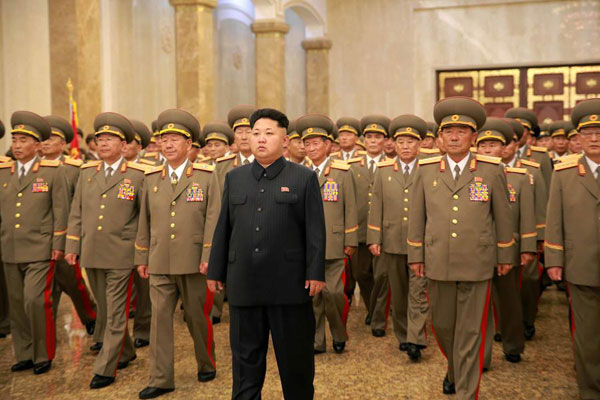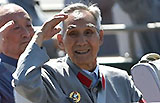ROK, DPRK to resume high-level contact Sunday afternoon
(Xinhua) Updated: 2015-08-23 07:32
 |
|
Top leader of the Democratic People's Republic of Korea (DPRK) Kim Jong-un (C) visits the Kumsusan Palace of Sun on July 27, 2015. [Photo/KCNA] |
The DPRK's KCNA news agency reported the start of the high-level contact, referring to the ROK as its official name "Republic of Korea" in a very rare move that raised hopes for an end to tensions caused by landmine blasts and the exchange of artillery fires across border. Pyongyang usually called the ROK "puppet state."
The highest-level meeting since President Park took office in February 2013 was held to defuse the heightened tensions caused by cross-border exchange of artillery fires on Thursday over the ROK's propaganda broadcasts. The ROK said it fired back a volley of artillery after the DPRK's shelling, but Pyongyang said it was a fabrication.
Top DPRK leader Kim Jong Un ordered the country's frontline combined forces to enter a state of war from Friday, and Pyongyang warned that the ROK stop its propaganda campaign with loudspeakers along the border until 5 p.m. Saturday (0800 GMT) or face military actions.
The ROK threatened stern retaliation against any further provocation. Seoul and Washington raised their joint reconnaissance position toward the DPRK to the second highest Saturday. The ROK forces remained on the highest alert.
The cross-border shelling, which caused no damages and casualties, intensified the already escalated tensions on the Korean Peninsula. On Aug. 4, three landmines detonated on the southern section of the DMZ, wounding two ROK soldiers on a patrol duty. Seoul claimed that those had been deliberately planted by DPRK forces, but Pyongyang denied any involvement.
From Aug 10, the ROK military resumed blaring the propaganda loudspeakers, silenced for the past 11 years, in frontline units in retaliation for the landmine blast. The DPRK threatened indiscriminate strikes against the loudspeakers.
- ROK, DPRK hold senior-level contact amid border tensions
- ROK warns DPRK of harsh price for any further provocations
- DPRK deploys more fire units to frontlines with ROK
- DPRK's Kim orders frontline army to enter state of war
- DPRK, ROK trade artillery, rocket fire at border
- DPRK warns military action if ROK continues frontline broadcasts
- DPRK drills target ROK loudspeakers






